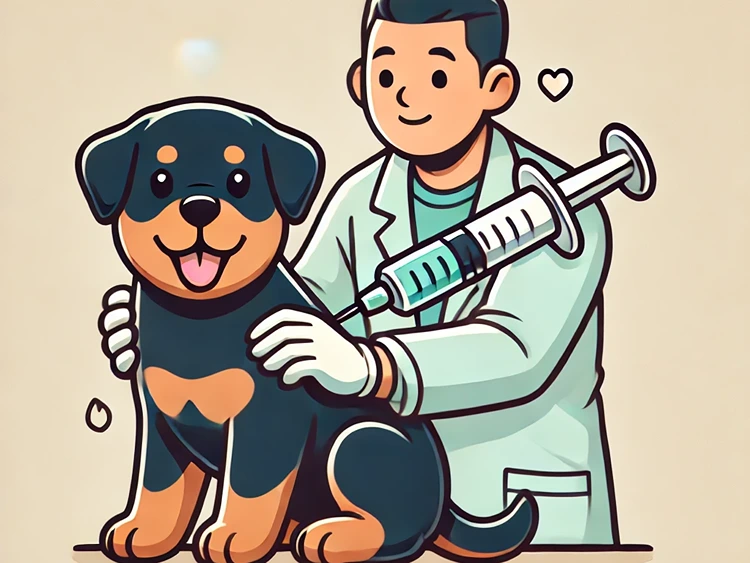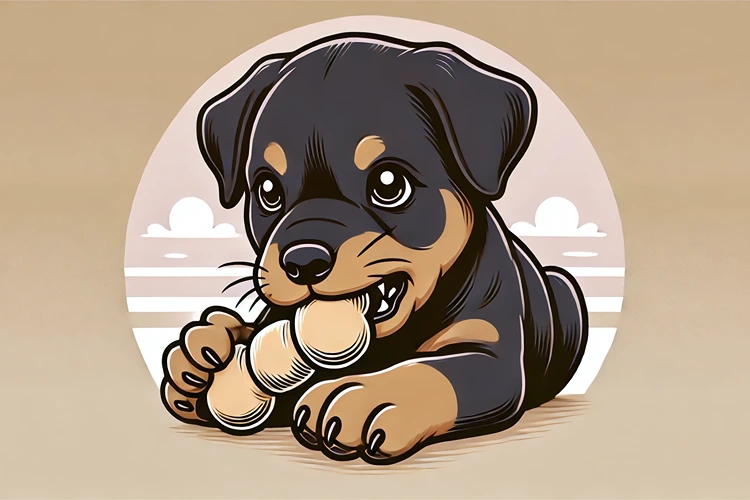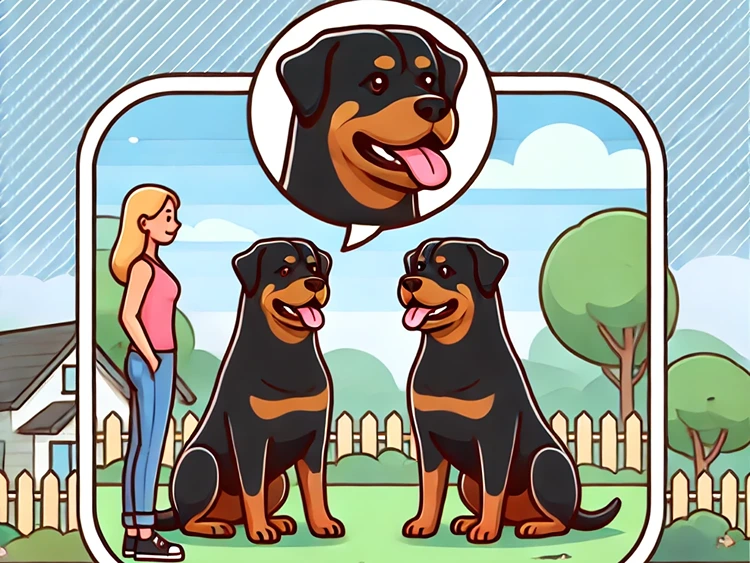Bringing a Rottweiler puppy into your home is an exciting experience, full of joy and the anticipation of many happy moments ahead. But with the excitement comes the responsibility of ensuring your new companion stays healthy and strong. One of the most critical steps in safeguarding your Rottweiler puppy’s health is following a proper vaccination schedule. Vaccinations are key to protecting your pup from a range of potentially deadly diseases, helping them build a strong immune system early on.
Why Are Vaccinations Important for Rottweiler Puppies?
Vaccinations play a vital role in the early development of your Rottweiler puppy’s immune system. Puppies are born with some natural immunity, thanks to the antibodies they receive from their mother’s milk. However, this protection only lasts for a few weeks. As your puppy grows, their immune system needs to be bolstered through vaccinations to fend off common diseases like parvovirus, distemper, and rabies.
What Diseases Can Vaccinations Prevent?
Vaccinations are designed to protect your Rottweiler puppy from several life-threatening diseases:
- Parvovirus: A highly contagious virus that affects the gastrointestinal tract of puppies, leading to severe vomiting, diarrhea, and dehydration.
- Distemper: A viral disease that affects a dog’s respiratory, gastrointestinal, and central nervous systems.
- Rabies: A fatal disease that affects the central nervous system and can be transmitted to humans through bites.
- Hepatitis: A viral infection that affects the liver, kidneys, and blood vessels.
- Parainfluenza: A respiratory virus that can lead to severe kennel cough.
How Do Vaccinations Work?
Vaccinations work by introducing a small, harmless piece of the disease-causing organism (like a virus or bacteria) into your puppy’s body. This stimulates the immune system to recognize the pathogen as a threat and produce antibodies against it. If your Rottweiler puppy is ever exposed to the actual disease, their immune system is already prepared to fight it off effectively, preventing illness.
Paw-some Tip:
It’s essential to follow your veterinarian’s recommended vaccination schedule strictly. Missing or delaying shots can leave your Rottweiler puppy vulnerable to infections, which could be fatal.
When Should Rottweiler Puppies Start Getting Vaccinated?
Timing is everything when it comes to vaccinating your Rottweiler puppy. The first round of vaccinations should begin when your puppy is between six and eight weeks old. This is typically when the maternal antibodies start to wane, and your puppy’s immune system needs external support to protect against diseases.
What Is the Recommended Vaccination Schedule?
A standard vaccination schedule for Rottweiler puppies might look like this:
| Age of Puppy | Recommended Vaccinations | Notes |
|---|---|---|
| 6-8 weeks | Parvovirus, Distemper | Begin vaccination schedule; keep puppy indoors until shots are complete. |
| 10-12 weeks | DHPP (Distemper, Hepatitis, Parainfluenza, Parvovirus), Leptospirosis | Start socialization in controlled environments after this round. |
| 14-16 weeks | DHPP, Rabies | Complete core vaccinations; consider starting heartworm prevention. |
| 12-16 months | Booster shots for DHPP, Rabies | Maintain a regular schedule for annual check-ups and boosters. |
These vaccinations are crucial in ensuring your Rottweiler puppy builds a robust immune system. However, always consult with your vet to tailor the schedule to your puppy’s specific needs, as they may recommend additional vaccinations based on your location and lifestyle.
Can Rottweiler Puppies Go Outside Before Being Fully Vaccinated?
It’s natural to want to take your Rottweiler puppy out for walks and socialization as soon as possible. However, until your puppy has received all the core vaccinations, it’s best to limit exposure to environments where they could encounter unvaccinated dogs or wildlife. This doesn’t mean you should keep your puppy indoors all the time. Instead, focus on controlled environments, like your backyard, until they are fully vaccinated.
Rottie Stats:
According to the American Veterinary Medical Association (AVMA), puppies who receive their vaccinations on time have a significantly lower risk of contracting diseases like parvovirus, which has a mortality rate of up to 91% in untreated cases.
Common Side Effects of Vaccinations in Rottweiler Puppies
While vaccinations are essential for your Rottweiler puppy’s health, it’s normal to be concerned about potential side effects. Most puppies experience mild reactions that resolve quickly, but it’s good to be aware of what to expect.
What Are the Typical Reactions to Vaccinations?
After receiving a vaccination, your Rottweiler puppy might experience:
- Mild fever: A slight increase in body temperature is a common response as the immune system reacts to the vaccine.
- Lethargy: Your puppy may feel a bit tired or less energetic than usual for a day or two.
- Swelling at the injection site: A small, firm lump may develop where the shot was given, but this typically goes away on its own.
- Decreased appetite: Some puppies might eat less than usual after vaccination, but their appetite should return within 24 hours.
These symptoms are usually short-lived and should not be cause for concern. However, if your puppy shows signs of a more severe reaction, such as persistent vomiting, diarrhea, difficulty breathing, or swelling of the face, you should contact your vet immediately.
Are There Long-Term Effects of Vaccinations?
Long-term effects from vaccinations are extremely rare. The benefits of vaccinating your Rottweiler puppy far outweigh the risks. Vaccines have been rigorously tested for safety, and any potential side effects are generally minimal compared to the danger of the diseases they prevent.
Paw-some Tip:
After your puppy’s vaccination, monitor them closely for the first 24 hours. Keep them calm and comfortable, offering plenty of water and a quiet space to rest. If you notice any unusual behavior, don’t hesitate to reach out to your vet.
How to Prepare for Your Rottweiler Puppy’s Vaccination Appointment
Getting your Rottweiler puppy ready for a vaccination appointment doesn’t have to be stressful. With some preparation, you can ensure that both you and your puppy have a smooth experience at the vet.
What Should You Bring to the Appointment?
When heading to the vet for a vaccination appointment, make sure to bring the following:
- Vaccination records: If this isn’t your first visit, bring any vaccination records you’ve already received so your vet can update them.
- Treats and toys: A few of your puppy’s favorite treats or a comforting toy can help them feel more at ease during the visit.
- Questions for your vet: Jot down any questions or concerns you might have about the vaccinations or your puppy’s health in general. This is a good opportunity to get expert advice.
How Can You Calm Your Puppy Before the Shot?
Puppies can pick up on your emotions, so it’s important to stay calm and relaxed before the appointment. Here are a few tips to keep your puppy calm:
- Stay positive: Speak to your puppy in a soothing, upbeat tone to reassure them that everything is okay.
- Exercise before the visit: Take your puppy for a short walk or play session to help burn off any excess energy before the appointment.
- Offer comfort: Hold or pet your puppy gently while waiting to help them feel secure.
What Should You Expect During the Appointment?
During the vaccination appointment, your vet will perform a brief physical exam to ensure your Rottweiler puppy is healthy enough to receive the vaccine. This might include checking their temperature, listening to their heart and lungs, and examining their eyes, ears, and mouth.
The actual vaccination process is quick and typically involves a small injection under the skin. Your vet may ask you to hold your puppy steady while they administer the shot. Don’t worry if your puppy yelps or flinches – the discomfort is brief, and they’ll likely forget about it quickly.
Rottie Stats:
A recent survey by the American Animal Hospital Association (AAHA) found that over 90% of pet owners believe vaccinations are essential for their dog’s health, highlighting the widespread trust in vaccination programs.
Understanding Booster Shots and Why They’re Necessary
Booster shots are an important part of your Rottweiler puppy’s vaccination schedule. These follow-up vaccines are designed to reinforce the immunity established by the initial series of shots. But why are they necessary, and how often should they be given?
What Are Booster Shots?
Booster shots are additional doses of a vaccine given after the initial series to ensure long-term immunity. While the first round of vaccinations provides your puppy with initial protection, the immunity can fade over time. Boosters help “remind” the immune system to stay alert and ready to fight off diseases.
How Often Do Rottweiler Puppies Need Booster Shots?
After your Rottweiler puppy completes their initial vaccination series, they will need booster shots at regular intervals. Typically, a booster is administered one year after the puppy’s last vaccine in the initial series, followed by additional boosters every one to three years, depending on the specific vaccine and your vet’s recommendations.
It’s crucial to keep track of these booster shots, as missing them can leave your dog vulnerable to the diseases they were originally vaccinated against. Your vet will provide a schedule to follow, so make sure to mark these dates in your calendar.
Are There Any Risks Associated with Booster Shots?
Just like the initial vaccinations, booster shots carry a very low risk of side effects. The most common reactions are mild and include temporary lethargy, a slight fever, or localized swelling at the injection site. These symptoms usually resolve on their own within a day or two.
Severe reactions to booster shots are rare but can include symptoms such as vomiting, diarrhea, or difficulty breathing. If you notice any of these signs, contact your vet immediately. Overall, the benefits of maintaining your Rottweiler’s immunity far outweigh the risks associated with booster shots.
Paw-some Tip:
Set reminders on your phone or calendar for your Rottweiler puppy’s booster shots. Consistency is key in maintaining their immunity and protecting them from potentially life-threatening diseases.
Common Concerns About Rottweiler Puppy Vaccinations
It’s normal to have concerns about vaccinating your Rottweiler puppy, especially with so much information available online. Let’s address some of the most common concerns and provide clarity.
Are Vaccinations Safe for My Rottweiler Puppy?
The safety of vaccinations is a common concern among pet owners. Vaccines used in veterinary practices are thoroughly tested for safety and efficacy before they’re approved for use. The risk of adverse reactions is very low, and the potential health benefits for your puppy are substantial.
If your Rottweiler puppy has any known allergies or previous reactions to vaccines, make sure to inform your vet. They can adjust the vaccination schedule or recommend alternative options to ensure your puppy’s safety.
Can My Puppy Skip Any Vaccinations?
Skipping vaccinations is not recommended, as it puts your Rottweiler puppy at risk for serious diseases. Core vaccines, like those for distemper, parvovirus, and rabies, are essential and legally required in many areas. Your vet can help you understand which vaccines are mandatory and which may be optional based on your puppy’s lifestyle and environment.
Will Vaccinations Hurt My Puppy?
While getting a shot can be uncomfortable, the pain is minimal and brief. Most puppies only experience a quick pinch and are back to their playful selves in no time. The long-term health benefits of preventing serious illnesses far outweigh the momentary discomfort of a vaccination.
If you’re still concerned about your puppy’s comfort during vaccinations, talk to your vet. They may be able to offer tips or techniques to make the experience as stress-free as possible for both you and your puppy.
This is the continuation of the article. The next part will cover additional aspects such as the importance of maintaining vaccination records, what to do if you miss a vaccination, and how to support your Rottweiler puppy’s immune system naturally.
Wrapping Up
Ensuring your Rottweiler puppy follows a proper vaccination schedule is one of the most important steps you can take to protect their health early on. By starting vaccinations at the right time, adhering to booster shot schedules, and understanding potential side effects, you’re setting your puppy up for a strong and healthy life. Vaccinations not only shield your Rottweiler from potentially deadly diseases but also contribute to the overall well-being of the community by preventing the spread of contagious illnesses.
As a responsible Rottweiler owner, staying informed and proactive about your puppy’s health is crucial. Regular veterinary visits, keeping detailed vaccination records, and understanding the importance of each vaccine can make a significant difference in your puppy’s development and long-term health. If you ever have concerns or questions, don’t hesitate to reach out to your vet—they’re your best resource for ensuring your Rottweiler grows up healthy and strong.
By prioritizing vaccinations and staying vigilant about your puppy’s health needs, you’re giving your Rottweiler the best start in life. Continue to engage with resources and communities that support responsible pet ownership, and you’ll be well on your way to raising a happy, healthy Rottweiler.




